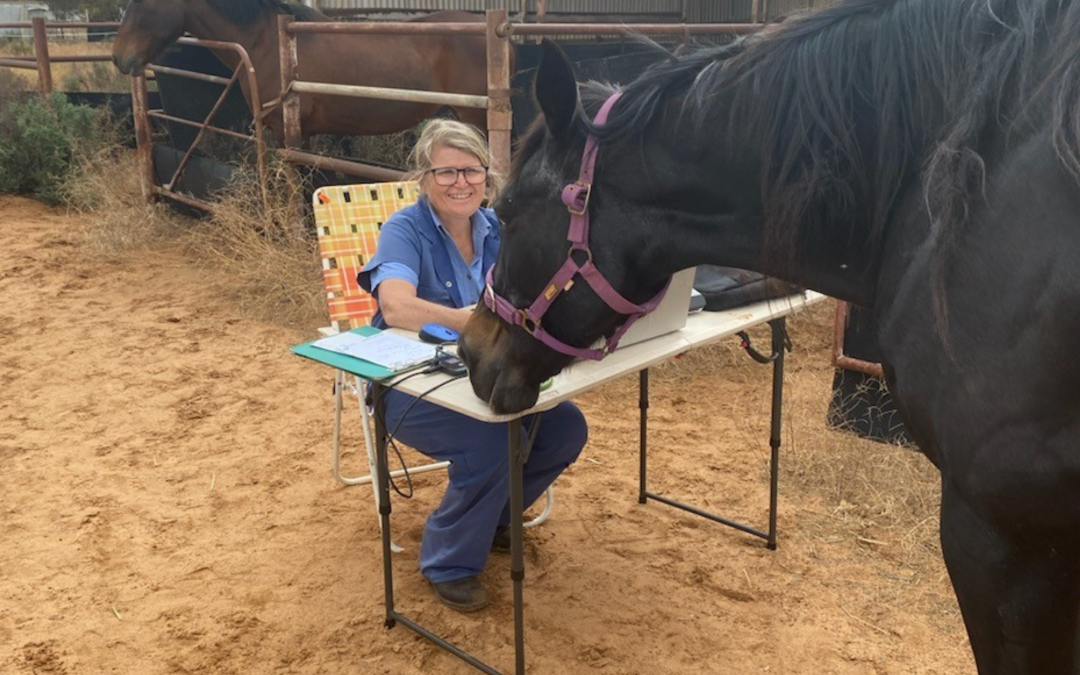For some, a career is simply a job; a means to an end. But for Kirsten Tunstill, being a veterinarian has been a lifelong passion, shaped by her early experiences and unwavering love for animals. Her journey, spanning decades of dedicated service in regional Australia, is a testament to resilience, compassion, and the deep bond between people and animals.
Kirsten’s story begins in the remote Pilbara region of Western Australia, where she grew up as the daughter of a mine manager working for Hamersley Iron. Life in Tom Price and Dampier was defined by the vast red landscapes and a tight-knit community, but her heart was always drawn to animals.
Her passion found direction when a travelling vet, Rick Fenny, periodically visited their town. Kirsten’s parents arranged for her to accompany him on his rounds, and from that moment, her future was set, she would become a vet. Like many country kids, she attended the local primary school before heading to Perth for boarding school in year 5. The transition was challenging, but her determination never wavered.
After graduating, Kirsten’s first role was in Northam, where she worked in a mixed veterinary practice for seven years. It was here that she developed the versatility required of a regional vet, caring for pets, livestock, and everything in between. Her work even took her overseas to England and Scotland, where she spent three months assisting with artificial insemination of sheep. The experience broadened her knowledge and allowed her to connect with farmers deeply dedicated to their livestock.
Choosing to remain in regional practice wasn’t just a career decision; it was a lifestyle choice. Kirsten saw firsthand the essential role vets play in rural communities and committed herself to providing compassionate and professional care to animals and their owners.
While living at Bimbijy Station with her family and providing a mobile veterinary service, Kirsten was privileged to homeschool her own children until they went on to boarding school. She found this incredibly rewarding and wouldn’t change anything about the choices she has made throughout her career.
One of the greatest rewards of veterinary medicine is the ability to improve the lives of animals while working alongside people who share the same passion. For Kirsten, every day spent with animals is a privilege, whether it’s tending to a beloved pet or ensuring the welfare of livestock.
But the job comes with challenges, too. The hardest part, she admits, is supporting owners through the grief that comes with the loss of their pets, a process that requires both empathy and strength. The demands of being constantly on call also take a toll, but her love for the work has always carried her through.
Among the many milestones in her career, one of the proudest was watching her daughter, Hannah, follow in her footsteps. When Hannah graduated as a veterinarian and joined Wheatbelt Vet Services, it was a full-circle moment; one that reinforced Kirsten’s impact on both her family and the wider community.
For those considering a career in regional veterinary practice, Kirsten’s advice is simple: be brave and go for it. Young vets who join Wheatbelt Vet Services receive incredible support and develop a diverse skill set. Regional practices foster a sense of family, and staff quickly become part of a close-knit team while they are away from their own families.
Through years of caring for animals, Kirsten has learned many lessons but one stands out: unconditional love and loyalty. Animals never judge. They love with their whole hearts, and that’s something we could all learn from.
After more than 30 years serving the Wheatbelt community, Kirsten hopes her legacy will be one of dedication, professionalism, and kindness. She has spent her career ensuring animals receive the best possible care, and she hopes that commitment will continue through the next generation of vets. She hopes she has built something that will last and that her work has made a difference to both animals and people.
While Kirsten has no plans to step away entirely, she is looking forward to slowing down over the next few years. Managing the clinic at Jurien Bay will remain a priority, but she also hopes to give back to the industry in other ways by sitting on the Veterinary Board, and contributing to Australia’s biosecurity efforts through the Veterinary Reserve, helping to protect the country from exotic diseases that could have a devastating effect on livestock and markets.
After decades of hard work, she’s ready for a new chapter; one that balances her passion for veterinary medicine with the opportunity to reflect on a career well spent. But one thing is certain: her impact on regional veterinary care will be felt for years to come.

